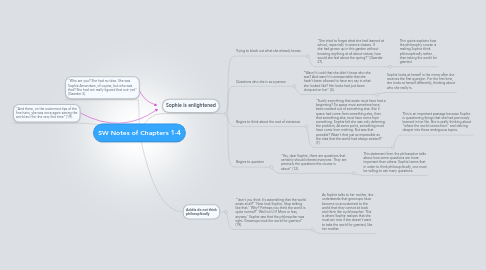
1. "Who are you? She had no idea. She was Sophie Amundsen, of course, but who was that? She had not really figured that out--yet" (Gaarder 3).
2. "And there, on the outermost tips of the fine hairs, she was once again seeing the world as if for the very first time" (19).
3. Sophie is enlightened
3.1. Trying to block out what she already knows
3.1.1. "She tried to forget what she had learned at school, especially in science classes. If she had grown up in this garden without knowing anything at all about nature, how would she feel about the spring?" (Gaarder 27).
3.1.1.1. This quote explains how the philosophy course is making Sophie think philosophically rather than taking the world for granted.
3.2. Questions who she is as a person
3.2.1. "Wasn't it odd that she didn't know who she was? And wasn't it unreasonable that she hadn't been allowed to have any say in what she looked like? Her looks had just been dumped on her" (4).
3.2.1.1. Sophie looks at herself in the mirror after she receives the first question. For the first time, she looks at herself differently, thinking about who she really is.
3.3. Begins to think about the root of existence
3.3.1. "Surely everything that exists must have had a beginning? So space must sometime have been created out of something else. But if space had come from something else, then that something else must have come from something. Sophie felt she was only deferring the problem. At some point, something must have come from nothing. But was that possible? Wasn't that just as impossible as the idea that the world had always existed?" (7).
3.3.1.1. This is an important passage because Sophie is questioning things that she had previously learned in her life. She is really thinking about "where the world comes from" and delving deeper into these ambiguous topics.
3.4. Begins to question
3.4.1. "Yes, dear Sophie, there are questions that certainly should interest everyone. They are precisely the questions this course is about" (12).
3.4.1.1. This statement from the philosopher talks about how some questions are more important than others. Sophie learns that in order to think philosophically, one must be willing to ask many questions.
4. Adults do not think philosophically
4.1. "'don't you think it's astonishing that the world exists at all?' 'Now look Sophie. Stop talking like that.' 'Why? Perhaps you think the world is quite normal?' 'Well isn't it? More or less, anyway.' Sophie saw that the philosopher was right. Grownups took the world for granted" (19).
4.1.1. As Sophie talks to her mother, she understands that grownups have become so accustomed to the world that they cannot sit back and think like a philosopher. This is where Sophie realizes that she must act now if she doesn't want to take the world for granted, like her mother.
